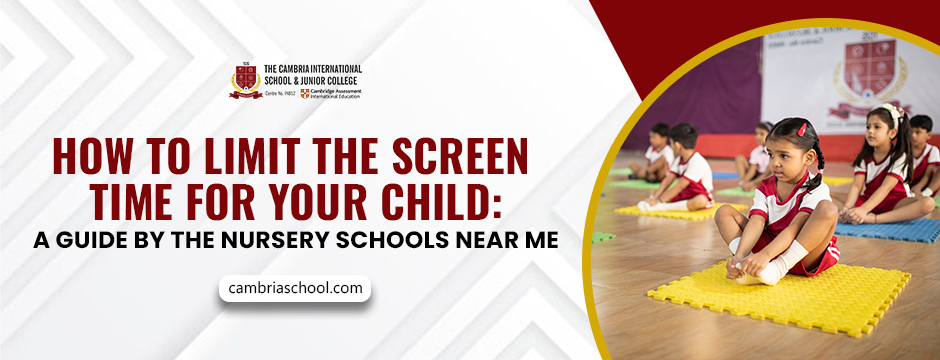How to Limit the Screen Time For Your Child: A Guide by the Nursery Schools Near Me
In today’s digital age, screens are everywhere — from smartphones and tablets to televisions and laptops. While technology can be a powerful educational tool, excessive screen time can have negative effects on young children’s cognitive, emotional, and physical development. Many parents struggle to find the right balance between screen use and healthy play, especially when digital devices are often used to calm, entertain, or educate young kids.
Nursery Schools Near Me emphasise the importance of setting healthy boundaries for screen use early in life. With years of experience in early childhood education, these schools understand the developmental needs of children and offer practical solutions that foster well-rounded growth. Limiting screen time isn’t about eliminating technology but about teaching children how to use it wisely and sparingly. This blog offers expert-backed strategies and easy-to-follow tips to help parents regulate their child’s screen time effectively.

Understand the Recommended Screen Time Guidelines
Health experts, including the American Academy of Paediatrics, suggest that children aged 2 to 5 years should have no more than one hour of high-quality screen time per day. For children under 2, screen time should be avoided entirely, except for video chatting with family.
Nursery schools that focus on early development highlight the need to follow these guidelines closely. Too much screen exposure at this age can interfere with sleep, reduce attention span, and hinder the development of communication and social skills.
Lead by Example: Practice What You Preach
Children mimic their parents’ behaviours. If they see adults glued to their phones or watching TV for hours, they’re more likely to adopt the same habits. Set a good example by limiting your own screen time with the help of the best preschool, especially during family meals, outdoor activities, and bedtime.
Use technology mindfully — and narrate your behaviour. For example, say, “I’m using my phone to check the weather,” to help children understand the purpose behind screen use rather than viewing it as constant entertainment.

Designate Screen-Free Zones and Times
Establish screen-free zones in the house, such as the dining room, kitchen, or bedrooms. Also, set up specific screen-free times like meal times, bedtime, and playtime. This creates structure and helps children understand that screens are not central to every aspect of life.
Nursery schools often have screen-free classrooms filled with books, puzzles, sensory toys, and art materials to stimulate creativity and learning. Parents can replicate this environment at home to reinforce the idea that non-digital activities are just as — if not more — fun and engaging.
Offer Engaging Alternatives to Screen Time
One of the best ways to reduce screen dependency is to provide children with exciting alternatives. Encourage them to engage in physical activities, imaginative play, drawing, reading, or building blocks.
Enrolling children in programs with structured learning, arts and crafts, music, or physical activities (like dance or yoga) can help fill their time with enriching experiences. Many nursery schools near you implement such a well-rounded curriculum to foster mental and physical development beyond screens.
Create a Screen Time Schedule
Consistency is key when limiting screen time. Create a daily or weekly schedule that allocates specific times for digital media. Ensure that screen time doesn’t interfere with sleep, meals, or physical activity.
Make the schedule visible by using colourful charts or a family calendar. This visual representation by the Nursery Schools Near Me helps children understand the rules and take part in following them. Giving children a sense of control over when and how they watch screens makes them more likely to respect limits.
Choose High-Quality Educational Content
When children do have screen time, ensure it’s purposeful and educational. Select age-appropriate content that encourages learning, problem-solving, and creativity. Apps and shows that are interactive and aligned with early learning standards are best.
Many nursery schools recommend co-viewing content with your child. Watching together allows you to explain what they see, ask questions, and make the experience more interactive. This transforms screen time into a shared learning moment rather than passive consumption.
Use Parental Controls and Timers
Most devices and apps offer built-in parental controls and screen time limits. Use them to restrict access to non-educational content or to limit the total time spent on screens. Set timers for each session so children know when it’s time to take a break.
These tools are especially useful for busy parents who may not always be available to supervise directly. However, they should complement — not replace — active parenting and open communication about screen use.
Encourage Outdoor Activities and Social Play
Physical play is essential for a child’s development. Encourage outdoor play in gardens, parks, or playgrounds. These activities not only improve physical health but also foster imagination, teamwork, and independence.
Social interaction is another key aspect often lacking in screen-heavy routines. Nursery schools put emphasis on group activities like storytelling, puppet shows, and music circles that teach cooperation and empathy — all vital for emotional development.
Talk About the Effects of Too Much Screen Time
Even young children can understand simple explanations about why too much screen time isn’t healthy. Talk about how it can hurt their eyes, make it harder to sleep, or take time away from playing with friends or toys.
Keeping the conversation age-appropriate helps children become more aware of their habits and makes them partners in the process rather than passive participants. It also builds trust, which can make setting and enforcing limits easier.
Work with Your Child’s Nursery School
Pre nursery near me plays a crucial role in reinforcing screen time habits. Partnering with your child’s educators allows for consistency between home and school environments. Share your concerns, ask for feedback, and discuss what activities can replace screen time at home.
Reputable nursery schools like Cambria School integrate screen-free learning environments, encouraging development through structured play, social learning, and age-appropriate instruction. They also help parents build and maintain positive habits that support the child’s well-being.
Final Words
Limiting screen time for children doesn’t mean eliminating technology — it’s about creating a balanced environment where digital tools serve educational and creative purposes without taking over their daily lives. Through thoughtful planning, open communication, and engaging alternatives, parents can help their children grow into healthier, more curious, and more socially aware individuals.At The Cambria International School, screen-free development is a foundational principle. Our experienced educators provide nurturing environments where children learn through hands-on activities, peer interaction, and creative exploration. If you’re looking for a Nursery Schools Near Me that understands the importance of balanced screen habits and holistic child development, we are an excellent choice to begin your child’s learning journey on the right foot.

